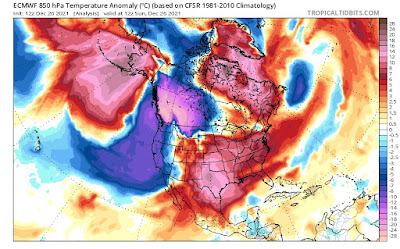But what's been going on lately is ridiculously off the rails. I mentioned a hint of it yesterday, when I discovered a report of a temperature of 8 degrees in Tanana with freezing rain falling.
It got even more bizarre in this vast northern state Monday. Kodiak, Alaska, on an island in the western Gulf of Alaska southwest of the mainland, reached 65 degrees on Monday.
It was easily the hottest temperature ever recorded in Alaska in December. Moreover, according to the National Weather Service office in Anchorage, it was the hottest temperature on record in Alaska for any date between October 5 and April 21. Which means it was the hottest on record for not only December, but November, January, February and March as well.
Kodiak's high temperature broke the record high for the date by 20 degrees. Which is a lot. It's equivalent to temperatures in the upper 70s in Burlington this time of year. Which is impossible. I hope. Most record highs this time of year in Vermont are in the upper 50s.
Meanwhile, deep in the interior of Alaska, Fairbanks is normally a very cold, dry place this time of year. Temperatures this time of year are often all over the place, but it's mostly very dry, with just little bits of snow here and there falling down during the winter.
Not this year. On Sunday, Fairbanks was slammed with tons of freezing rain and snow. If you melted down all that ice and snow, you got 1.93 inches of water, which was easily the wettest December day on record up there, and the third wettest for any time of the year. Precipitation for the month up there is 4.75 inches, the most on record for December. Normal precipitation for the month is around a half inch.
Temperatures were in record territory in Fairbanks, too, with highs around 40 degrees the past few days. The warmth in Alaska is coming after an especially frigid November and December, even by that state's standards.
Alaska's extremes are coming as incredible temperature anomalies are occurring across almost all of North America. Record warmth is happening in Alaska, a vast stretch of central and eastern United States and in northeastern Canada. Record lows and brutal winter storms are hitting southwestern Canada and the northwestern United States.
(Vermont is one or the few places in North America where temperatures are fairly close to normal).
The extreme warmth does cover an area much larger than the extreme cold, even if that patch of cold in southwest Canada is record setting. I'm pretty sure this bizarre weather week is brought to us in part by climate change.
The temperature extremes are contributing to a near record fast west to east jet stream over the United States. Flights from Los Angeles bound for New York are landing way earlier on the East Coast than scheduled as a result.


No comments:
Post a Comment